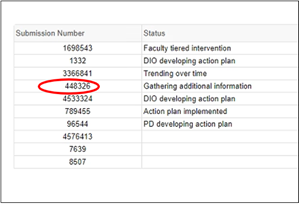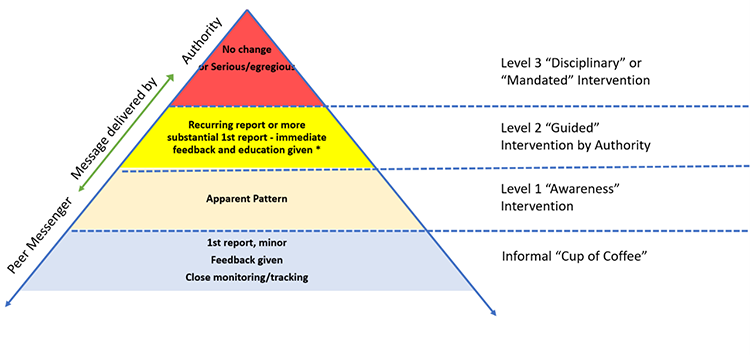We want to recognize what is going well, as well as identify areas for improvement. This form can be used for reporting exemplary teaching and positive experiences and reporting concerns like negative learning experiences (i.e. sleep rooms, duty hours, teaching etc.) and mistreatment. The more you provide feedback, the better we can make your experience and the experiences of your peers. Making us aware allows us to advocate on your behalf and make changes.
Mistreatment arises when behavior shows disrespect for the dignity of others and unreasonably interferes with the learning process. It can take the form of physical punishment, sexual harassment, psychological cruelty and discrimination based on race, religion, ethnicity, sex, age or sexual orientation.
AAMC Definition of Mistreatment
- Threatened with physical harm or physically harmed.
- Required to perform personal services.
- Subjected to offensive remarks related to gender, sexual orientation, national origin, race, color, religion, or any other category protected by law.
- Denied opportunities for training or rewards based upon membership in a protected group.
- Subjected to lower evaluations or grades solely because of membership in a protected group.
- Publicly embarrassed or humiliated.
- Subjected to unwanted sexual advances.
- Asked to exchange sexual favors for grades or other rewards.
- Subjected to the threat of revoking visa status for foreign nationals.
For more information, please review the Reporting Mistreatment or Harassment of Medical Students Policy.
Although we do our best to make sure all our programs offer a great learning environment, residents and fellows are our eyes and ears. Sharing your feedback will help us both resolve your issue and create a better environment for all residents and fellows. Letting us know about your positive experiences and exemplary teachers helps us create best practices and helps us celebrate those who contribute in a positive way to our learning environment.
All reports will be confidential with only the necessary individuals being aware of the report. Anonymous reports are ones where the identity of the reporter is unknown. You can report anonymously, and we understand this might be the most comfortable way of reporting. However, we want to make sure you know that the more information we have, the better we are equipped to respond.
We realize reporting a concern can be a difficult and uneasy situation. GME is your partner and will do our best to honor your boundaries and work with you on how to proceed in a way that is safe and comfortable. If you’re still uncertain about reporting, please review the other ways you can report mistreatment in the FAQ below.
Every situation is different, and we take every feedback form entry seriously. Positive learning experience reports and exemplary teaching reports are handled with the standard faculty feedback flow. Mistreatment and negative learning experience reports are addressed urgently unless the reporter selects an alternate time frame.
In most cases, the process is as follows:
- Standard Process Flow (PDF).
- Mistreatment Process flow (PDF).
- Negative Learning Experience Process flow (PDF).
The Feedback Dashboard contains for a summary of submissions. A reporter can look for the row with their submission number.

If you indicate that you would like to have further discussion, you will be contacted as the issue is being evaluated. In addition, if you provide your contact information, you will be provided with updates as the issue is addressed.
Depending on the nature of the feedback, coaching or other performance management actions are possible and may happen. If such actions do occur, the specific actions will be handled privately.

Feedback form entries are sent directly to the GME staff ombuds and Wendy Hylton, the accreditation consultant. Wendy is the only person with access to the full database. Wendy will review and share relevant information with appropriate contacts (i.e. program director, chair, Learning Environment Committee, DIO/associate dean of GME, Wellness director, Department educational lead, GME diversity director) based on the type of feedback.
The University’s Office of Institutional Equity (OIE) is responsible for reviewing and, where appropriate, objectively investigating complaints of discrimination and harassment in accordance with the Nondiscrimination and Anti-harassment Policy.
Reports of such conduct submitted through the GME Feedback Form will be immediately directed to OIE and Banner HR.
- Standard Process Flow (PDF).
- Mistreatment Process flow (PDF).
- Negative Learning Experience Process flow (PDF).
Reporting Options
- GME Feedback form.
- Banner Health Compliance Hotline:
- Phone Number: 888-747-7989.
- Banner Human Resources:
- Amber.campos@bannerhealth.com or Laura.Vitali@bannerhealth.com.
- Phone: 520-694-4002.
- University of Arizona Office of Institutional Equity (includes Title IX):
- Phone 520-621-9449.
- Email: @email .
If you are seeking guidance, please consult on of the following:
- Chair.
- Department educational leadership.
- Program director.
- Program administrator.
- Teaching faculty.
- Faculty advisors.
- Chief residents.
- GME office staff.
- Associate dean, GME.
- Director, GME Wellness.
- Banner Human Resources.
- University of Arizona Office of Institutional Equity (includes Title IX).
If you indicate that you want them and provide an email address, Smartsheets will send you a copy of your responses for your records. In that case, your email address will not be recorded in the form, and no one can see it.